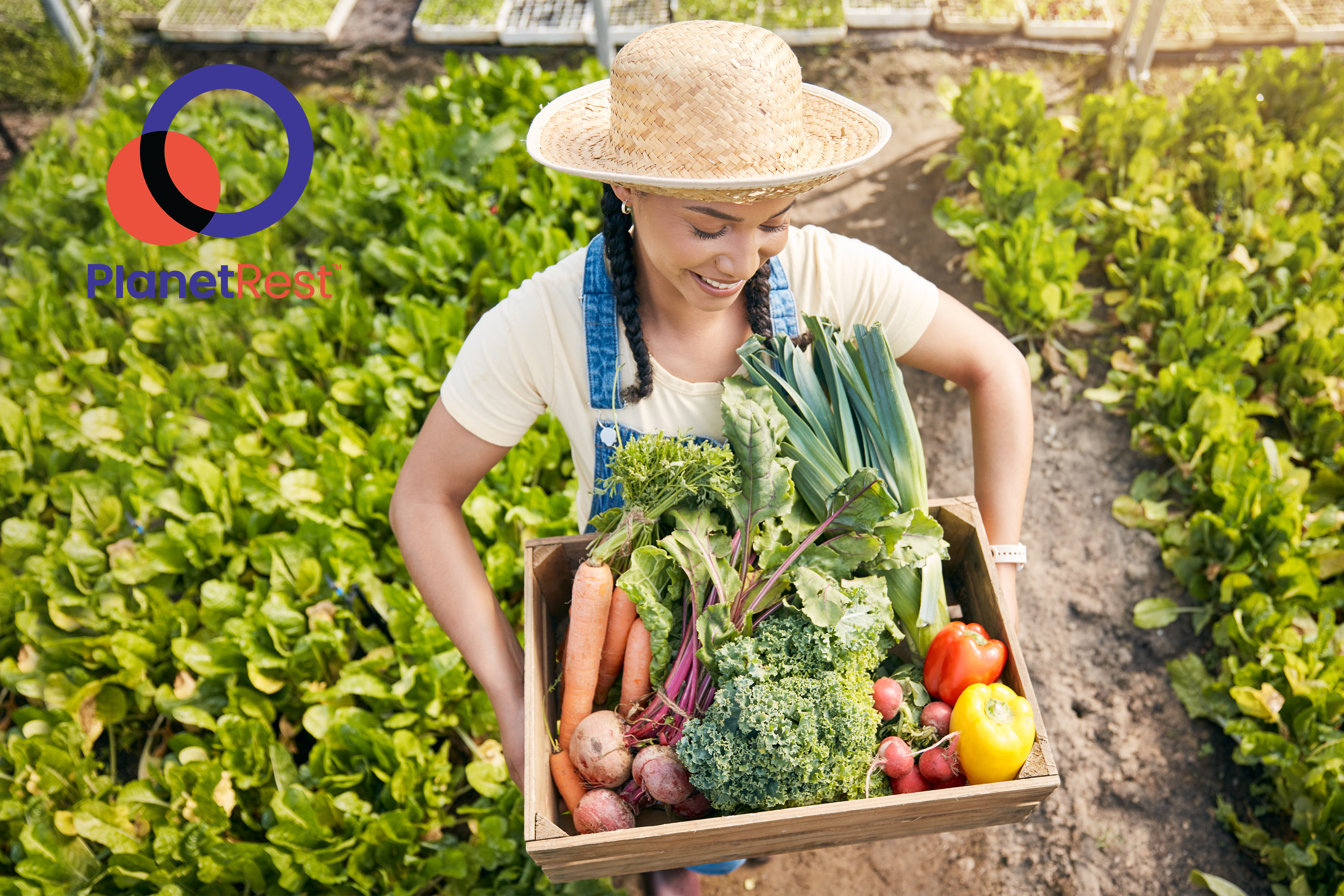
28 May Sustainable Food
A Key Ingredient for a Healthier Planet
The way we grow, produce, and consume food has a profound impact on the health of our planet. Agriculture accounts for a significant portion of global greenhouse gas emissions, deforestation, and water use, making food production one of the largest contributors to environmental degradation. However, the shift toward sustainable food systems offers a powerful solution to these problems. At PlanetRest, we believe that transforming our food production and consumption habits is essential to reducing humanity’s ecological footprint and moving the Earth Overshoot Day further into the year.
What is Sustainable Food?
Sustainable food systems focus on producing, processing, and distributing food in ways that minimize environmental harm while ensuring long-term food security. This means using farming techniques that conserve natural resources, protect biodiversity, and reduce greenhouse gas emissions. Sustainable food also emphasizes ethical sourcing, animal welfare, and social responsibility, ensuring that food production supports healthy ecosystems and communities.
A major element of sustainability in food production is reducing the reliance on industrial agriculture, which often involves the heavy use of chemical fertilizers, pesticides, and monoculture crops that deplete soil health. Instead, sustainable farming practices, such as regenerative agriculture, permaculture, and agroecology, focus on restoring soil fertility, increasing biodiversity, and reducing the carbon footprint of farming.
The Founders of the PlanetRest Foundation’s Approach: AirSprouts and Vertical Farming
At PlanetRest, we’re committed to supporting innovative solutions to the food sustainability challenge. One of our founders key initiatives is AirSprouts, a vertical farming solution designed for urban environments that allows individuals and businesses to grow their own fresh produce with minimal environmental impact. AirSprouts uses LED lighting, aeroponics, and smart technology to create the perfect growing conditions for leafy greens and other vegetables right in the comfort of your home.
The benefits of vertical farming extend beyond individual households.
By enabling urban farming, we reduce the need for transporting food over long distances, which cuts down on carbon emissions from supply chains. AirSprouts offers an eco-friendly solution for addressing food deserts in cities and promoting a more localized, sustainable food system. Not only does this help lower our collective carbon footprint, but it also ensures greater food security for urban communities.
The Impact of Our Diet Choices
Changing how we produce food is only part of the solution. What we eat plays a significant role in determining our environmental impact. One of the most effective ways to reduce your personal carbon footprint is to incorporate more plant-based meals into your diet. Animal agriculture is responsible for a large share of methane emissions, land use, and water consumption. By reducing meat and dairy consumption, individuals can make a significant difference in lowering greenhouse gas emissions and conserving water resources.
At PlanetRest, we advocate for a flexitarian approach—you don’t need to go fully vegan or vegetarian to make an impact. Small, incremental changes such as eating one plant-based meal a day or adopting Meatless Mondays can contribute to significant reductions in emissions and resource use. Supporting local, seasonal, and organic produce further reduces the carbon footprint of your diet by cutting down on food miles and promoting sustainable farming practices.
Reducing Food Waste: A Simple, Yet Powerful Change
Another critical component of sustainable food systems is addressing the issue of food waste. Shockingly, one-third of all food produced globally is lost or wasted, which not only squanders precious resources but also adds unnecessary emissions to the atmosphere. The food waste that ends up in landfills produces methane, a greenhouse gas that is far more potent than carbon dioxide. Reducing food waste is one of the easiest and most impactful ways individuals can help combat climate change.
Simple changes like meal planning, composting, and using leftovers can drastically reduce the amount of food you waste at home. Additionally, supporting businesses and policies that tackle food waste on a larger scale—such as grocery stores donating surplus food to local food banks—can create a broader cultural shift toward sustainability in our food system.
Building a Sustainable Food Future
At PlanetRest, we believe that building a sustainable food system requires collective action. That’s why we encourage everyone to take part in the PlanetRest Pledge and commit to making small, impactful changes in their diets and food consumption habits. Whether it’s growing your own food, reducing food waste, or choosing plant-based meals, every action counts.
By focusing on innovative solutions like vertical farming and supporting regenerative agriculture, we can ensure that future generations have access to healthy, sustainable food without depleting the planet’s resources. Through sustainable food choices, we can help move Earth Overshoot Day back and give the planet the rest it needs to recover.
Together, we can cultivate a future where food production is in harmony with nature, and where every bite we take contributes to a greener, healthier planet. Join us at PlanetRest in making these critical changes and help us pave the way for a sustainable food future.



No Comments